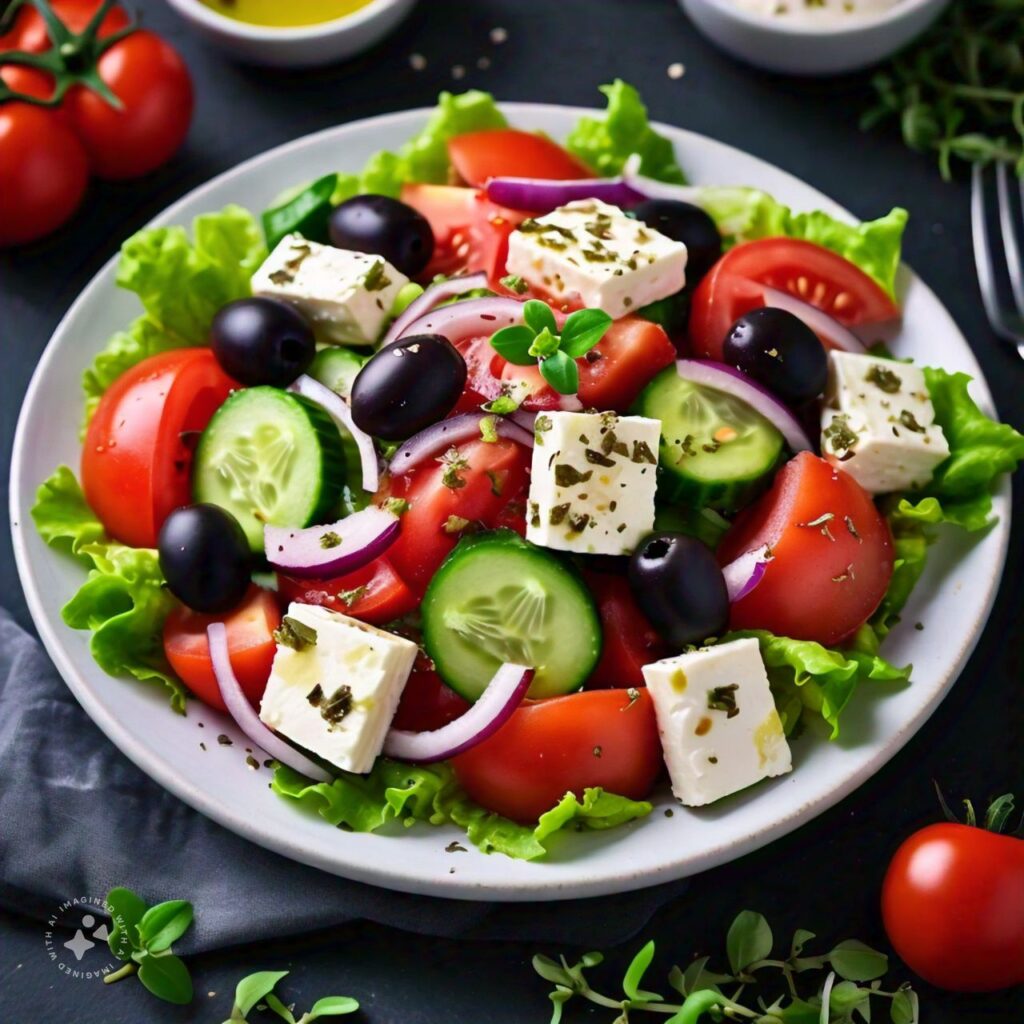Salads are simple to make and incredibly convenient to eat, aside from their crunchy appearance and bright colors. Because they can provide essential nutrients and fiber while being low in calories, salads can play a role in losing your fat.
However, it’s crucial to pay attention to the salad’s and dressing’s contents because some of them may be rich in fat and added sugars, which would negate the advantages. Choose salads with lots of leafy greens, veggies, and a low-fat dressing to help you lose weight. Additionally, including items high in protein like chicken, tofu, or beans may support boosting feelings of satiety and fullness.
Origin
The origin of Greek salad is somewhat disputed, but it is generally believed to have originated in Greece. Greek salad, also known as “horiatiki” salad in Greece, is a traditional dish that has been enjoyed for centuries in the Mediterranean region.
Greek salad typically consists of fresh vegetables such as tomatoes, cucumbers, red onions, and bell peppers, along with feta cheese, olives, and a simple dressing made from olive oil and lemon juice. The dish is often served as a light meal or as a side dish and is a staple of Greek cuisine.
The exact origin of Greek salad is not known, but it is likely that the dish evolved over time as a way to use fresh and readily available ingredients in a simple and delicious way. Regardless of its origin, Greek salad remains a popular and beloved dish in Greece and around the world.
For Healthy Weight Loss;
The origin of the Greek salad, also known as a macrobiotic salad, is not clear, but it is commonly believed to have originated in Greece and is a staple in Greek cuisine.
As for benefits, It is a nutritious dish that is low in calories but high in fiber, vitamins, and minerals. It is typically made with fresh ingredients such as tomatoes, cucumbers, red onion, bell peppers, Kalamata olives, feta cheese, and dressed with olive oil and lemon juice. These ingredients provide important nutrients such as vitamin C, potassium, and healthy fats. Eating salad as part of a balanced diet can support overall health and help with weight loss management.
Greek salad is a nutritious and delicious dish that offers several health benefits. Some of the benefits include:
- Low in calories: Greek salad is made with fresh vegetables, which are low in calories, making it an excellent option for those who are looking to lose weight.
- Rich in vitamins and minerals: Greek salad is loaded with vitamins and minerals, such as vitamin C, potassium, and iron, which are essential for a healthy body.
- Good source of fiber: Greek salad contains plenty of fiber from the vegetables, which can help with digestion and prevent constipation.
- Contains healthy fats: Greek salad often contains ingredients like olives, which are a good source of monounsaturated fats, which have been linked to improved heart health.
- Boosts immunity: Greek salad is high in antioxidants, which can help protect the body against disease and boost immunity.
Overall, Greek salad is a delicious and nutritious dish that can be enjoyed as a main dish or as a side dish. It’s a great option for anyone looking to eat a healthy and balanced diet.
Try this incredibly simple recipe, which is full of seasonal flavors and fresh ingredients, for your next side dish.
Recipe
Ingredients:
- 4 medium tomatoes, chopped
- 1 large cucumber, sliced
- 1 medium red onion, thinly sliced
- 1/2 cup Kalamata olives
- 4 Oz crumbled feta cheese
- 3 tbsp. extra-virgin olive oil
- 2 tbsp. freshly squeezed lemon juice
- 1 tsp dried oregano
- Salt and pepper, to taste
Instructions:
- In a large bowl, combine the chopped tomatoes, sliced cucumber, red onion, Kalamata olives, and crumbled feta cheese.
- The olive oil, lemon juice, oregano, salt, and pepper whisk them in a medium container
- Pour the dressing over the vegetables in the large bowl and gently toss to combine.
Let’s enjoy your delicious and healthy salad for breakfast, lunch, or an after-dinner treat.
If you want to read about some yoga exercises please visit following link



1 Comment
I don’t think the title of your article matches the content lol. Just kidding, mainly because I had some doubts after reading the article.